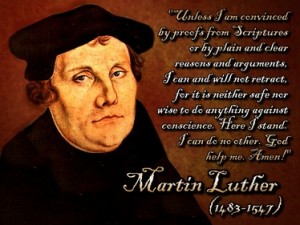During the Protestant Reformation, Martin Luther became widely known as one of the most powerful and forceful leaders in the 16th century. Within the PBS film, “Martin Luther: The Reluctant Revolutionary,” the plot captures the journey of a man that truly changed the course of history. Throughout this time, the Catholic Church was recognized as a more authoritative and influential source over the king and his rulings. At the beginning of Luther’s studies and career, he obeyed this strict concept in order to prevent God’s disapproval. The Catholic Church manipulated the idea of heaven and hell so that the people of Europe would follow their lead and donate unnecessary funds when asked. As a servant of God, Luther believed he would enter the gates of heaven through a life within the monastery. Luther was unable to find the enlightenment that he searched and deserved for as a monk. After several years passed, he agreed to become a professor of theology at a university. Through this act, Luther developed the idea that salvation can be reached by simply believing in God and having faith
“You are not only responsible for what you say, but also for what you do not say,”
Martin Luther preached. The purpose of this statement is to exemplify the determination that he possessed to take down the controlling behavior of the Catholic Church. Upon the church’s doors, his Ninety-Five Theses were nailed for the public to read. The Ninety-Five Theses listed the many reasons as to why his theory of salvation was accurate. The chaos that occurred after his construction was enormous as it spread like wildfire thanks to Johannes Gutenberg’s invention of the printing press. This piece of technology allowed his information to travel with distance and speed throughout Europe.
The PBS film documented Luther’s announcement as one of Europe’s most successful authors. The readers of his work praised his ruthless tone against authority. In addition, the film highlighted many important pieces that contributed to Luther’s success. There were several facts that stood out to me however, I captured and documented the ones that related to how Martin Luther’s acts and the printing press changed history. First, after the madness and violence simmered down, there was no longer one Christian Europe. This eventually turned over globally as the rest of the world watched and shadowed this type of revolution. Second, Luther is known as the first propagandist as he protested against authoritative figures by nailing his theses on the doors. Lastly, I was inspired by his motivation to help end dishonest corruption through the quote, “You can kill a person, not an idea.” This statement proves that his idea of salvation stuck in the minds of millions with the efficiency of the printing press. Whether the church, king or anti-followers sought out violence to be noticed or heard, the central idea was undoubtedly the leading force of it all.
Watch the PBS film now: Martin Luther: The Reluctant Revolutionary
Quote source: “You are not only responsible for what you say, but also for what you do not say”


Leave a response